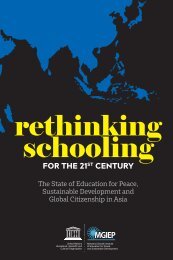The Blue DOT Issue 13
Reimagining Education: Beyond the Rhetoric
Reimagining Education: Beyond the Rhetoric
Create successful ePaper yourself
Turn your PDF publications into a flip-book with our unique Google optimized e-Paper software.
Teachers of the<br />
Future<br />
HINDA INA BICAJ<br />
T<br />
he classroom was<br />
always an environment<br />
of frustration, fear and<br />
anxiety - a place that<br />
stripped me of the freedom to make<br />
my own choices and become my<br />
own person. I grew bored with my<br />
voice not mattering or being silenced<br />
altogether. Consequently, I became the<br />
noisy brat who constantly disagreed with<br />
the teachers or stirred up debates. I had<br />
no other choice - it was disrupt or sleep,<br />
but sleeping led to far more trouble and<br />
disruption at least kept me somewhat<br />
engaged!<br />
A teacher in middle school transformed<br />
my relationship with the classroom,<br />
education and most importantly,<br />
myself. One day when I was especially<br />
Ina is a Kosovar Albanian who graduated from Think Global School. She is a member<br />
of Uzina Cultural Space in Tirana where she engages in grassroots work as an active<br />
member of her home community. She’s part of a project implementing a creativity<br />
module with the aim of offering a safe space where kids can flourish creatively.<br />
Ina is committed to challenging illegitimate forms of power and the way we structure<br />
our working and learning spaces, beginning with the classroom setting. Ultimately,<br />
she wants to promote a more joyful education so that kids are happier, more<br />
motivated and better critical thinkers!<br />
compassion encouraged an open and<br />
trusting learning environment where<br />
the students could freely contribute,<br />
take risks, and truly challenge ourselves.<br />
Studies confirm that) students who feel<br />
unconditionally accepted by their teachers<br />
are more engaged in learning and more<br />
likely to enjoy challenging tasks (Makridisengaged,<br />
she invited me to chat with<br />
her after class. I confessed to her that the<br />
problem was that I was overly emotional.<br />
She comforted me by explaining that<br />
my ability to feel so much was rather<br />
admirable, a strength, and that she<br />
always appreciated my sensitivity in class<br />
discussions.<br />
That simple act of acceptance has shaped<br />
me in profound and lasting ways. I learned<br />
to accept and value my emotionality,<br />
rather than repress processes completely<br />
natural to the human mind. I loved that<br />
class. Not only was it stimulating and<br />
intriguing, but the teacher valued what<br />
each one of us brought – the debates, the<br />
sensitivity, and the irascibility.<br />
Her unconditional acceptance and<br />
<strong>The</strong> classroom was<br />
always an environment<br />
of frustration, fear and<br />
anxiety - a place that<br />
stripped me of the freedom<br />
to make my own choices<br />
and become my own<br />
person.<br />
Botsari, 2001, qtd. in Kohn, 2005). I want teachers of the future to<br />
challenge kids to grow by making them feel heard, supported, and<br />
loved.<br />
I was recently reminded of my middle school experience when<br />
hanging out with kids from a marginalized neighborhood. <strong>The</strong>y<br />
told me how much they disliked school and how they skipped<br />
class because of it. <strong>The</strong>y’d joke about their teachers slapping them<br />
or dismissing them. In an attempt to design a different learning<br />
environment for these kids, my friends and I took on the challenge<br />
of creating an after-school creativity module.<br />
We tried to make the module as much of a dialogue as possible<br />
with those whom it would impact the most. <strong>The</strong> kids chose the<br />
activities they’d like to participate in and identified what they<br />
wanted to learn. We also included them in decision-making, to<br />
show them that we trust their capabilities and that their voices and<br />
REFERENCES<br />
“Unconditional Teaching (#)”. Alfie Kohn, 2005, https://www.alfiekohn.org/article/unconditional-teaching/.<br />
needs matter. This inevitably meant discarded lesson plans, messy<br />
and loud discussions, and the occasional group conflict. However,<br />
exactly in those moments of perceived chaos, the students<br />
were forced to think critically and cooperate. In a trusting<br />
and caring environment, they learned to resolve disputes<br />
on their own. Allowing students to make decisions and to<br />
take charge is crucial for creating responsible citizens.<br />
I never managed to express my gratitude to my middle school<br />
teacher, Ms. Shayna. That’s why I’m grateful that the kids I work<br />
with give me letters and drawings after almost every session. When<br />
the kids discuss what they like most about the module, they seldom<br />
mention the field trips or fun outdoor learning experiences. <strong>The</strong>y<br />
talk much more about the care and compassion of the facilitators.<br />
As both a student and as a teacher, I’ve realized that what kids<br />
will remember most is not the details of your lesson plans or the<br />
contents of their textbooks, but rather how you make them feel.<br />
ISSUE • <strong>13</strong><br />
6 3

















